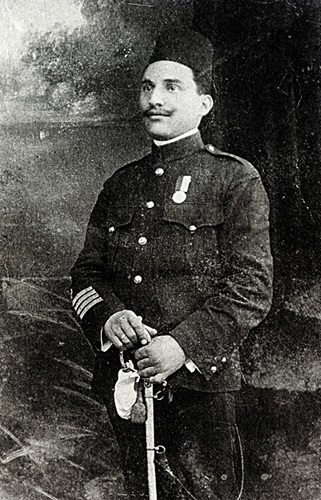The 1927 US version of Misirlou sung by Tetos Demetriades.
Most people would be familiar with the tune from the opening scene of the 90's classic film Pulp Fiction, however, most would be unaware of its origins. The tune is called Misirlou (Egyptian Girl). The term Misirlou originates from the Arabic Miṣr which means Egypt. In Greek, the suffix -ou denotes the feminine form of a name. The Greek lyrics to the song describe the love between a Greek Christian man and an Egyptian Muslim woman. The exact origins of the tune are unknown however it's likely to have originated in Asia Minor/Anatolia, the Levant or Egypt, all regions formerly under Ottoman control.
The first known recording of the song in the US in Greek is in 1927. In Greece around this time, the tune was being performed by Michalis Patrinos, an Ottoman Greek from Smyrna, with a rebetiko-style rhythm. Rebetika music, otherwise known as the Greek blues, likely has origins in Anatolia before 1922. In a 1931 recording of the tune, Patrinos - who was born Konstantinos Kalogeras - pronounces the title Mousourlou and uses a few Persian words in the lyrics which are primarily Greek.
In the 1927 US recording, Nikos Roubanis is credited as the copyright owner of the song while Tetos Demetriades is the singer. Demetriades was born in Constantinople (today Istanbul) in the late 1800's. At the time, Constantinople was part of the Ottoman Empire. He moved to the US in 1921 during the second phase of the genocide. It's worth noting that in the US, the Misirlou melody was also being used by Jewish-Americans and Lebanese-Americans from the 1920's onwards. As mentioned, the tune has unknown origins and has been interpreted by various musicians over the years.
In 1941, Roubanis recorded Misirlou with a more jazzy rhythm. It was subsequently rearranged and performed by a number of artists including Dick Dale as well as the Beach Boys in the 60's. The Dick Dale version, an upbeat version of the original Rebetiko tune was used in the opening scene of the film Pulp Fiction. Listen to the Dick Dale version here.
According to Jan Dalley and David Cheal, in 1961, Dick Dale (real name Richard Monsour), who was of Lebanese descent from his father's side, was asked at one of his concerts if he could play an entire song on one string of his guitar. Dale, a pioneer of surf music, chose Misirlou which he had remembered from his childhood and played it at a much faster pace and the crowd loved it. The song subsequently appeared on his 1962 album Surfers' Choice and he played it on The Ed Sullivan Show. The Beach Boys heard it, loved it and recorded it on their second album Surfin' USA (1963).
 |
 |
|
| Tetos Demetriades (Source) | Nikos Roubanis (Source) |
Theóthotos "Tetos" Demetriades (1897-1971) was born in Constantinople. He was a singer, composer, lyricist, guitarisτ, record producer, manager and record company owner. Demetriades arrived in the U.S in 1921 and made his first recording with Columbia the following year. By 1942, he had recorded around 300 songs, mainly Greek tunes but also others. Around 1930, he became the manager of the foreign language division of the Victor Talking Machine Company and made numerous trips to Greece where he managed Victor recordings there. In 1945, Demetriades left RCA-Victor and established his own record company called Standard Phono Company with its Colonial and Standard labels. From the time of its formation until the time it was sold in the 60's, it became one of the most important American companies specializing in foreign music, with record releases in more than 10 languages. He died in New Jersey in 1971.
Nikos Roubanis (1885-1968) was born in Nafplio Greece. He was originally from Stemnitsa, Greece. At the age of about 25, Roubanis went to Egypt to work as a music-conductor in the service of King Fuad I. Around 1925 he moved to America, where he founded the Roubanis Choir in New York, with which he participated in about 20 recordings. He produced a number of compositions including polyphonic church music and created the Divine Liturgy of the Orthodox Church of America. He returned to Greece around 1965 where he died shortly afterwards.
Jan Dalley, David Cheal. The Life of a Song. Vol. 2. The Stories Behind 50 More of the World's Best-loved Songs. 2018. Accessed online via Google Books
Regina F. Bendix, Galit Hasan-Rokem. A Companion to Folklore. Wiley Blackwell, 2014. Accessed online via Google Books
Bio of Nikos Roubanis: vmrebetiko.gr
Bio of Tetos Demetriades: vmrebetiko.gr



